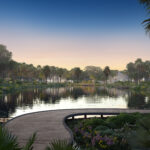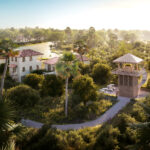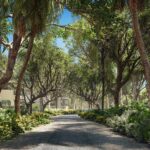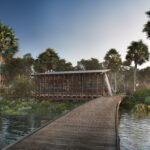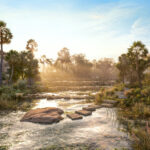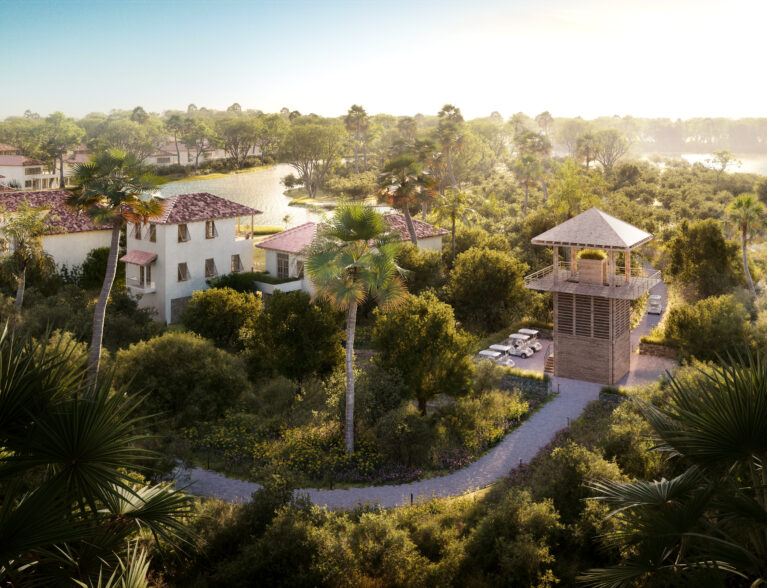
After at least eight years of planning, Windsor will break ground next month on North Village, a 40-home, ecologically sensitive subdivision that will be the New Urbanist community’s final phase.
Focused on “sustainable living and forward-thinking solutions to the challenges presented by climate change and biodiversity loss,” in the words of Betsy Hanley, president of Windsor Real Estate, North Village qualifies as a major real estate milestone on the barrier island.
The North Village site is a natural for ecologically inclined development. Its northern border adjoins Pelican Island National Wildlife Refuge, the first federal wildlife refuge, while its western border is defined by the Historic Jungle Trail, which continues to evoke Florida’s bucolic, pre-condo-tower past.
North Village was designed by architect and urban planner Andres Duany, who designed the main Windsor community in the early 1990s and is known to island residents as the visionary behind Vero Beach’s big Three Corners riverfront redevelopment project.
More than half of the North Village will be devoted to parks, greenspaces and islands, with a freshwater lake and a saltwater estuary with a tidal connection to the Indian River Lagoon.
Windsor promises “landscaping inspired by the Indian River Lagoon’s rich ecology” that will be “a feast for the senses, a horticultural tapestry of native plant species selected for color, scent and suitability for the barrier island’s particular climate … [creating] an environment in which wildlife can continue to flourish.”
There will be permanent art installations incorporated into the native landscaping, walking and riding trails, a kayak launch point, an observation tower that looks out over the expanse of Pelican Island Wildlife refuge, and a 14,000-square-foot fitness and wellness center with spa rooms that will be accessible to the entire Windsor community.
There will be 36 single-family homes on lots that are either 75 feet by 150 feet or 80 feet by 150, with the short side facing the street, and six row houses.
North Village is part and parcel of a broad move by Windsor to intensify its environmental relevance, bringing greater awareness of both the fragility of nature and its power to support and enhance daily life to Windsor residents and the surrounding community.
Last week, Windsor’s golf course was certified as an Audubon Sanctuary, “joining an elite group of the world’s most sustainable golf clubs,” according to a Nov. 20 press release. “The designation … reflects the club’s dedication to enhancing the area’s natural surroundings and strengthening local wildlife habitat.”
“Windsor has shown a strong commitment to its environmental program,” said Christine Kane, Audubon International CEO. “They are to be commended for their efforts to provide a sanctuary for wildlife on the golf course property.”
Earlier this month, Windsor’s marketing director Jane Smalley was appointed to the board of directors of the nearby Environmental Learning Center with the goal of promoting and empowering the beloved island nature center while also integrating it more fully with the Windsor community as North Village takes shape.
“I was made aware of the many ELC offerings for all age groups and that the organization wanted to grow its support from the Windsor membership,” Smalley told Vero Beach 32963 regarding her decision to join the board.
“Education on the importance of sustainability and making critical changes to the way we live is key to the success of the North Village project, and the ELC could not be a better partner for Windsor on that front.
“My No. 1 goal this season is to build awareness of the ELC’s important mission and offerings within Windsor and with our partners in the area. I hope I can make greater inroads for the ELC within the business community and help grow the organization’s corporate donor base.”
At the same time, the Environmental Learning Center is helping shape the vision for North Village, with ELC campus manager and native plant expert Marc Spiess assisting the landscape design team with selection and placement of native plants that benefit wildlife and require less water than typical landscaping.
Established as a private sporting club in 1989 by Canadian retail billionaire W. Galen Weston and his wife Hilary M. Weston, the 400-plus-acre Windsor community has had a focus on sustainability since its founding, according to Hanley.
“At its core, Windsor embraces the principles of New Urbanism, optimizing density to create ample green spaces and fostering a pedestrian-friendly environment,” Hanley said.
Windsor also mandates Anglo-Caribbean architecture, which like many historical styles has sustainability baked in by centuries of human intelligence and adaptability.
“The Anglo-Caribbean style is sustainable by its own nature as it is designed to take every advantage of the sun and climate and orientation,” says Vero Beach architect Clem Schaub, who has designed approximately 60 homes in the community and is in the early stages of designing a North Village house for one of his clients.
“Windsor is special in how it celebrates outdoor living. The North Village is land planned to integrate the village concept into a native Florida landscape setting. The new guidelines call for the architecture to marry with the land.
“I am inspired by Windsor’s desire to push ourselves to build even lighter on the land, to look for better ways to construct our building while keeping the knowledge learned from the past before air conditioning existed,” Schaub added.
Development of North Village appears to be the catalyst that has expanded the community’s environmental consciousness and intensified its focus on sustainability.
The subdivision, which was not part of the original Windsor master plan, has been a long time coming.
Galen Weston bought 52 acres of abandoned citrus land at the northern edge of the main Windsor development from Kennedy Groves in 1999, paying $2.8 million, according to county records.
The land remained fallow for 20 years, the sunbaked haunt of birds, reptiles and scurrying mammals until 2018, when Windsor presented an initial conceptual plan for North Village to county planners, outlining the basic shape and intent of the community.
There was some pushback by neighboring landowners, some internal rethinking that refined the environmental focus, and then COVID-19 came along, and the project remained in limbo for several more years.
It regained momentum in 2023, as the rest of Windsor approached buildout.
“They got site plan approval and planned development approval a year ago,” said Ryan Sweeney, the county’s assistant planning and development services director, who helped guide the project though the planning process.
At the county commission meeting where the matter was considered last December, commissioners asked a lot of questions and noted concerns of nearby residents but ended up approving the project unanimously.
Mark Justice, vice president of construction and development at Windsor, who will oversee the construction of North Village, thanked Sweeney and his staff at the meeting for the years of hard work and collaboration that led up to the green light from commissioners.
“Their land development permit, which is a technical, construction-level document and the final permit they needed to start, was issued on Oct. 29,” Sweeney said. “Mark Justice told me they will definitely start work this year.”
That jibes with Windsor’s statement that “the North Village is on target to begin construction before the end of this year.”
Windsor is selling finished lots to buyers who will bring their own architects and employ one of Windsor’s approved construction companies to build the personalized designs the architects come up with.
Approved builders include Barth Construction of VB, LLC, Croom Construction Company, Huryn Construction, RCL Development, Inc. and Reilly Construction. Lots start at $1.1 million and are 65 percent sold out.
“A new edition of the Windsor Architectural Code, created exclusively for the North Village, outlines the architectural and sustainable building practices that each home in the North Village is required to meet,” Windsor said in a statement.
“Homes will honor Windsor’s Anglo-Caribbean heritage but will encourage a more modern, pared-down aesthetic. They will also be required to achieve a certification through the Passive House Institute US (Phius), which promotes high-performance building practices for energy efficiency and homeowner comfort.”
Phius is a nonprofit organization “committed to decarbonizing the built environment by making high-performance passive building the mainstream market standard,” according to the organization. “We train and certify professionals, maintain and update the Phius climate-specific passive building standard, certify and quality assure passive buildings, certify high-performance building products and conduct research to advance high-performance building.
“The Phius Standard targets the sweet spot where aggressive energy and carbon reduction overlap with cost effectiveness, taking into account a full range of variables including climate zone, building size, building density, source energy and costs … providing energy savings of 40 to 60 percent, compared to regular buildings.”
In turn, the Phius certification can be used to help homes qualify for LEED certification, the main standard worldwide for “green” buildings, which has certified 197,000 projects in 186 countries and territories totaling more than 29 billion square feet over the past 30 years.
Architects love to innovate, and Schaub is happily engaged with his North Village project.
“We are in the ‘discovery period’ on the home,” he said. “We have been given the rare luxury of some extra time while the groundwork is being done. We are studying different methods of construction, new materials, new systems and even how technology/smart systems can be integrated into the house. It’s quite exciting!”
Windsor said North Village will be completed in 2027. As it takes shape, embodying the community’s search for sustainability in concrete, wood, metal and glass, Smalley will be expanding the interpersonal dimension of the effort.
“We have lots of ideas for programs designed for Windsor’s multi-generational membership,” Smalley told Vero Beach 32963. “This month we are holding a native plant lecture with Marc Spiess. In the spring we are planning a children’s nature themed activity. I will also be hosting some social events at the ELC campus and out on their pontoon boat and encouraging our members to visit and learn about everything the ELC offers.”
In the meantime, Windsor has created “an Environmental Task Force to look at ways to incorporate some of the North Village initiatives in other parts of the community,” Smalley added. “The Task Force, made up of various department heads, meets regularly to discuss and implement positive changes. We are all learning a lot, having fun, and celebrating large and small accomplishments.”
Renderings provided

